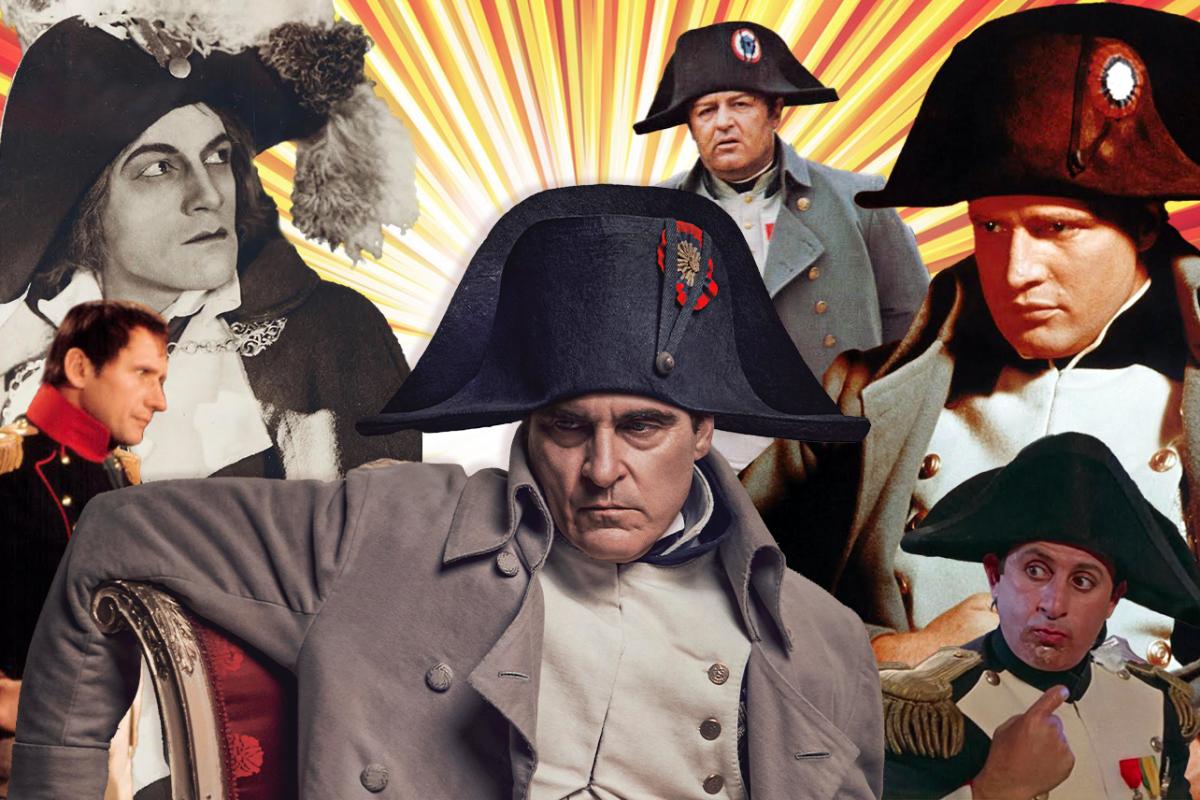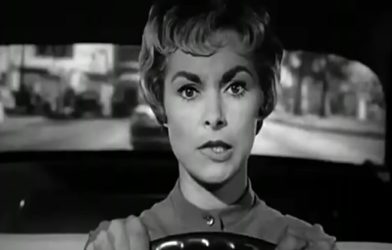What was the deal with Napoleon, anyway? The United States education system has never been particularly good at getting across why this Corsican-born self-styled liberator, conqueror, slaughterer and definer of a certain way of being très French is so important even to this day. We Yanks know he was short, that he was often seen with one hand tucked beneath his vest, that he dated a woman named Josephine, that there’s a pastry named after him, and that he had that hat, and that he was obliged to retire after something called Waterloo.
In a few days, a longish film about the man, directed by Ridley Scott and starring Joaquin Phoenix in the title role, will hit screens nationwide. Film bros of course know that a Napoleon film was a cherished yet never-realized project of Stanley Kubrick, a somewhat fitting thing given that Kubrick was some kind of imperialist. Scott is no slouch in ambition or confidence himself, but as we’ll see, any filmmaker who wants to tackle the subject has one giant cinematic obstacle to overcome. It’s the first of my Top 5 Napoleon movies.
That would be the 1927 Napoleon, an over-five-hour epic directed by Abel Gance that ends with a military triumph in the 1790s — decades before Napoleon’s death. This monster film was meant to be the first of five biopics Gance proposed. He only got to make one follow-up, thirty years later, about the battle of Austerlitz.
The most recent, and seemingly definitive, restoration of Gance’s Napoleon can only be streamed in its entirety via the British BFI site, alas. But there are plenty of snippets on YouTube. It’s a still-astonishing crazy quilt of a movie. It’s fully invested in the mythological superhero status of the emperor. At certain crucial points of the story, for instance, Napoleon is visited by an eagle who seems to call his name, just like in that old Paula Abdul song. By the same token, the picture wears its painstaking verisimilitude on its sleeve, with intertitles like “All the scenes in Corsica were photographed in the exact locations where the incidents occurred. — Author’s note.” Gance wants you to know where he got his dialogue — bits of Napoleon’s speeches are often noted as “historical.” For instance:” “Believe me…a man will come who will reunite the hopes of a nation…and then…”
In the title role, Albert Dieudonné doesn’t perform so much as incarnate an icon. The movie zips like crazy, especially as Gance caricatures the gargoyles of the French Revolution and riffs on Jacque-Louis David’s classical painting of the assassination of Marat. For the insane final battle scenes, Gance pioneered a technique called Polyvision, syncing three different reels of film to be projected in a widescreen configuration. The technique not only gave Gance incredible panoramas of massed armies, but jaw-dropping split-screen montages, celebrating Napoleon as a sci-fi math master of maps and clocks. When Kubrick conceived his own Napoleon film he did so with a certain humility, knowing he’d have to knock it out of the park harder than Gance did. In any event, the movie, although torn to shreds before its current restoration, proved genuinely intimidating.
So it’s not entirely inapt that the next truly noteworthy depiction of Napoleon on screen was a cameo in which the fellow’s face was not even seen. The 1949 Reign of Terror, also titled The Black Book, is an unusual historical feature directed by the then-maestro of Film Noir, Anthony Mann. Working with ace low-light cinematographer John Alton, who’d also brought the moody and stark vibes to contemporary crime fare like T-Men and Raw Deal, Mann navigated a maze of post-French-Revolution betrayal and unrest with spectacular brio. After the pulse-pounding finale dispatching Richard Basehart’s creepy Robespierre, his second-in-command, Fouche, slinks out of the bakery that the sea-green schemer (see Thomas Carlyle, my people) had been using as an office. Fouche, with a lean and hungry look (he is played by Arnold Moss, a great character actor who would later turn up in Mann/Alton’s galvanic Border Incident; Moss’s son, Jerry, grew up to be a songwriter and is responsible for the immortal Muppet classic “Rubber Ducky”) remarks to another observer of the ongoing tumult, “Robespierre’s last monument. He planned on building statues to himself. All he leaves behind…is stale bread.” For emphasis he tears apart a loaf. The soldier to whom he speaks says, “The art of being a Frenchman…is knowing what comes next.” Amused by his presumption, Fouche asks, “Do you have any idea?” and is informed “I am neither a Frenchman nor a politician. I am merely a soldier.” Fouche, before departing, asks the solder’s name. “My name is Bonaparte. Napoleon Bonaparte.” Just like James Bond. “I’ll try to remember,” Fouche says dismissively. It’s a great “things to come” coda to a romping espionage tale. (The actor standing for Napoleon has never been officially identified, but his voice was dubbed by character actor Shepperd Strudwick.)
The development and hyping of ultra-widescreen format CinemaScope in the early 1950s put 20th Century Fox on its TV-battling high horse, and one of the first maestros of widescreen was a now otherwise forgotten German-born journeyman director named Henry Koster, who directed the first CinemaScope picture, 1953’s definitively sweeping and kitschy The Robe. Koster followed this up with 1954’s Desiree, an account of Napoleon through the eyes of his first love, the not-Josephine Desiree Clary. (Who is not even afforded a cameo in Gance’s vision; he sort of substitutes her with a fictional character named Violine.) In this arguably frivolous spectacle, Napoleon is played by that era’s ultry-sultry master thespian, Marlon Brando himself. It’s a turn that Brando could have phoned in, one supposes, only he doesn’t. In interviews from the time, Brando complains of being caricatured and typecast as a sloppy mush-mouth, and here he underplays the military genius while at the same time articulating his syllables with as much precision as Richard Burton might have. He manages to make grand pronouncements such as “Before next New Year’s Eve I will sleep in Moscow” and “I’m one of the men who make history” sound pretty credible. A highlight is a ballroom dance between Napoleon and Jean Simmons’ title character. Undercut by a perceived betrayal, Brando conveys a bubbling anger that almost breaks through the façade of master strategist.

In the end, when Desiree goes to the Chateau de Malmaison, where Napoleon is holed up with his private army, and tries to convince him to surrender to the new French government, he muses, “I wonder what my destiny might have been had I married you.” So essentially, this movie is Past Lives, only WITH NAPOLEON.
Woody Allen made his history-as-farce comedy Love and Death in 1975, well before he earned (or did not earn, depending on who you believe) his current notoriety; that may not cut much ice for you, so if you simply cannot stand the sight of the guy, you’ll want to pass on this picture. As it happens, from where I sit, it’s one of Allen’s better pure comedies (and really, his last such picture, given that he’d follow it with the more art-film-adjacent Annie Hall, and he’d stay parked in that garage for the remainder of his career), an insouciant spoof of period movie epics with erudite nods to Russian lit and Eisenstein and Bergman. Napoleon’s campaigns in Russia loom over the travails of Allen’s Boris Grushenko. Informed that the crusader from Corsica has invaded Austria, he quips, “Why, is he out of Courvoisier?” The definitively cowardly Boris (his protestations that he doesn’t want to be a soldier constitute Allen’s purest tributes to Bob Hope, who conquered American box office playing a series of lily-livered risk-avoiders), upon being conscripted, gets this pep talk in basic training: “Imagine your loved ones conquered by Napoleon and forced to live under French rule! Do you want them to eat that rich food and those heavy sauces? Do you want them to have souffle every meal and croissant?”
And indeed when we first encounter Napoleon (Boris and his oft-conflicted wife Sonja, played of course by Diane Keaton, have concocted a hare-brained scheme to assassinate him), he is nitpicking the ingredients of his eponymous pastry, still in development. “No raisins. If this pastry is to bear my name it must be richer.” He is intent on beating the beef dish named for his British rival Wellington to market. “The future of Europe hangs in the balance.”

Napoleon is here played by James Tolkan, who’d later tell Tom Cruise that his ego is writing checks that his body can’t cash in Top Gun. He’s quite funny here, as is, interestingly, Howard Vernon, the Jess Franco regular who also played Professor Von Braun in Jean-Luc Godard’s Alphaville. Vernon plays one of Napoleon’s generals, a mad schemer whose fulminations — “I will form an alliance with the crown…not the king, just the crown” — climax with one of Allen’s greatest punchlines.
“What you’re telling me is that Napoleon was a short, dead dude.” So says a very disappointed Bernie Casey, as history teacher Mr. Ryan, to two of his charges, Bill S. Preston, Esquire, and Ted “Theodore” Logan. Alex Winter and Keanu Reeves are the immortal airheads of 1989’s Bill and Ted’s Excellent Adventure, wherein they save themselves from flunking out by time-traveling in a pay phone booth and collecting historical figures to weigh in on contemporary San Dimas, California.
Napoleon is in fact the first historical figure they come upon in the Stephen Herek-directed picture, and they’re not even looking for him. After observing him through his spy glass in 1805 Austria, the military commander, played by Terry Camilleri (who is himself of Maltese origin — that’s not too far from Corsica) says, in French, “Blow them up” as they wave from the phone booth. Some explosion mishap sends the hatted one into a time vortex with them, and the duo entrust Napoleon to Ted’s little brother Deacon. “Take him to the movies or something,” they instruct. Instead, Deacon takes him to an ice cream emporium where the future emperor consumes an enormous dish called “The Zyggie Pig.” For this he is snidely congratulated by two waiters, who are played by co-screenwriters Ed Solomon and Chris Matheson. (Full journalistic disclosure: I am friendly with Mr. Solomon, whose recent work in collaboration with Steven Soderbergh — the movie One False Move and the miniseries Full Circle — has been killing it, and who is as awesome a dude as you’d hope a Bill and Ted co-creator would be.) Despite being game enough to finish a Zyggie Pig, Napoleon doesn’t leave a good impression on Deacon, who loses the fellow.
“Do you realize you stranded one of Europe’s greatest leaders?” Ted asks indignantly. “He was a dick!” Deacon shoots back. Eventually they find him at a water park named, you guessed it, Waterloo, and snag him in time for the greatest high school history report in the history of high school history reports. This absurdist movie hews to verisimilitude by maintaining the reality that neither Napoleon nor Socrates spoke English, and in knowing that Freud was fluent. As Joan of Arc, Go-Go member Jane Wiedlin scarcely speaks. All of them, with Billy the Kid and Abraham Lincoln and Genghis Khan filling out the group, find a form of consumerist adjacent fulfillment at the San Dimas mall before delivering their notes. The movie is as charming and funny as it was back when we were approaching the millennium.
Veteran critic Glenn Kenny reviews new releases at RogerEbert.com, the New York Times, and, as befits someone of his advanced age, the AARP magazine. He blogs, very occasionally, at Some Came Running and tweets, mostly in jest, at @glenn__kenny. He is the author of the acclaimed 2020 book Made Men: The Story of Goodfellas, published by Hanover Square Press.
Load more…
Source link











